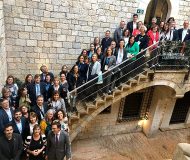

The Regional Minister of Health, Alba Vergés, presented the Charter of Commitment for gender equality on 22 October during the closing ceremony of the first Gender Summit in Health Sciences at CaixaForum Girona. The document was signed by the directors and representatives of the 19 health research centres and institutes in Catalonia, including Dr Jordi Surrallés, director of the São Paulo Research Institute, and Miriam Ors, deputy director. See more The Charter includes 12 commitments to end gender inequality in the research system in Catalonia. It was agreed, among others, to tackle vertical and horizontal wage inequality by the same responsibility and professional level; to eliminate the obstacles that prevent women from advancing in their scientific careers; and to promote changes in organisational culture and professional structure to eliminate systemic barriers, stereotypes and inequalities. In addition, it has been decided to carry out a one-year work plan to accelerate women’s advancement and leadership in health research.
Gender scissors
The Minister of Health, Alba Vergés, highlighted “the Department’s firm commitment to promoting the gender perspective in health policies and at the same time promoting changes in health research in Catalonia”. Vergés stressed that the data presented “show the so-called gender scissors” which, among others, she explained is translated with “lack of female leadership of the centres; in which women have less possibilities to receive funding for research and fewer invitations to give lectures and participate in panels, while few relevant positions in the authorship of publications. Faced with this situation, the councillor pointed out that “this summit -” leader in the European sphere and the first with real data- must serve to provide solutions to the problem “and added that the first step is with the Charter of Commitment, signed. In this sense, Vergés underlined some of the commitments of this Charter, such as now, that of tackling horizontal and vertical wage inequality, and that of eliminating the obstacles encountered by women in the transition between the completion of a doctorate and a stable professional career. “We cannot and do not want to lose talent,” she said during her speech. Vergés also stressed the commitment to train researchers and support them to include the gender perspective in research and innovation, and concluded that “the knowledge produced will benefit the entire population and not just men, half of the population.
Precisely, the studies presented during the summit indicate that significant steps have been taken, but that the so-called “gender scissors” are maintained. One of the most worrying aspects is the lack of women in the leadership positions of the centres. Once they finish their doctorate, the professional careers of men and women diverge and they see their promotion and advancement in the research career slowed down. The numbers presented during the day indicate that of the 7,167 people who work in the research centers, 3,907 (that is, 55%) are women; but they have it more difficult to progress in the research career so that, among other reasons, they have less access to funding to carry out their research. For example, of the 46 ICREA grants (the most prestigious in science) in Catalonia, only 20% are awarded to women. In addition, women get less money than men when research projects are presented: specifically, 19,000 euros less for each project.
Another problem that has been put on the table during the summit is that women are less likely to occupy relevant positions in the authorship of publications of scientific articles. 44% of the principal researchers are women, but at the time of publication there is only 28% female leadership.
The summit, promoted by the Department of Health and the Catalan Agency for Health Quality and Assessment (AQUA) in collaboration with the “la Caixa” Foundation, also brought together renowned international experts in the implementation of the gender perspective in research and biomedicine.